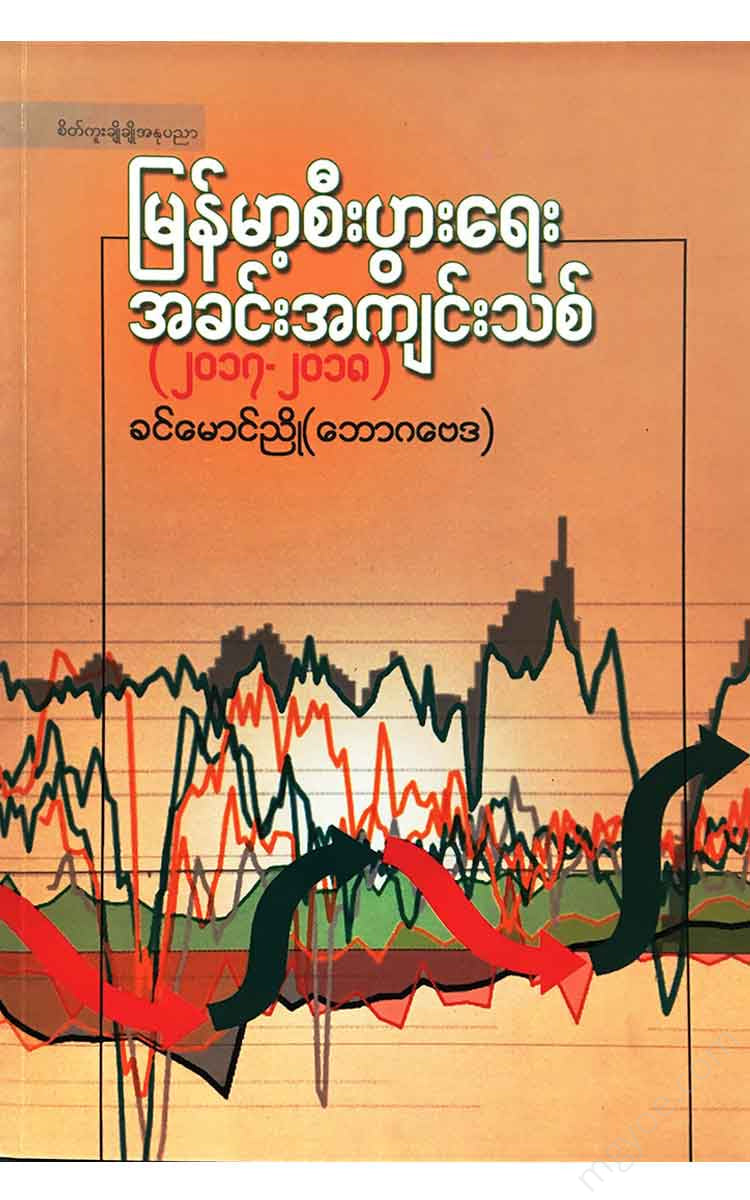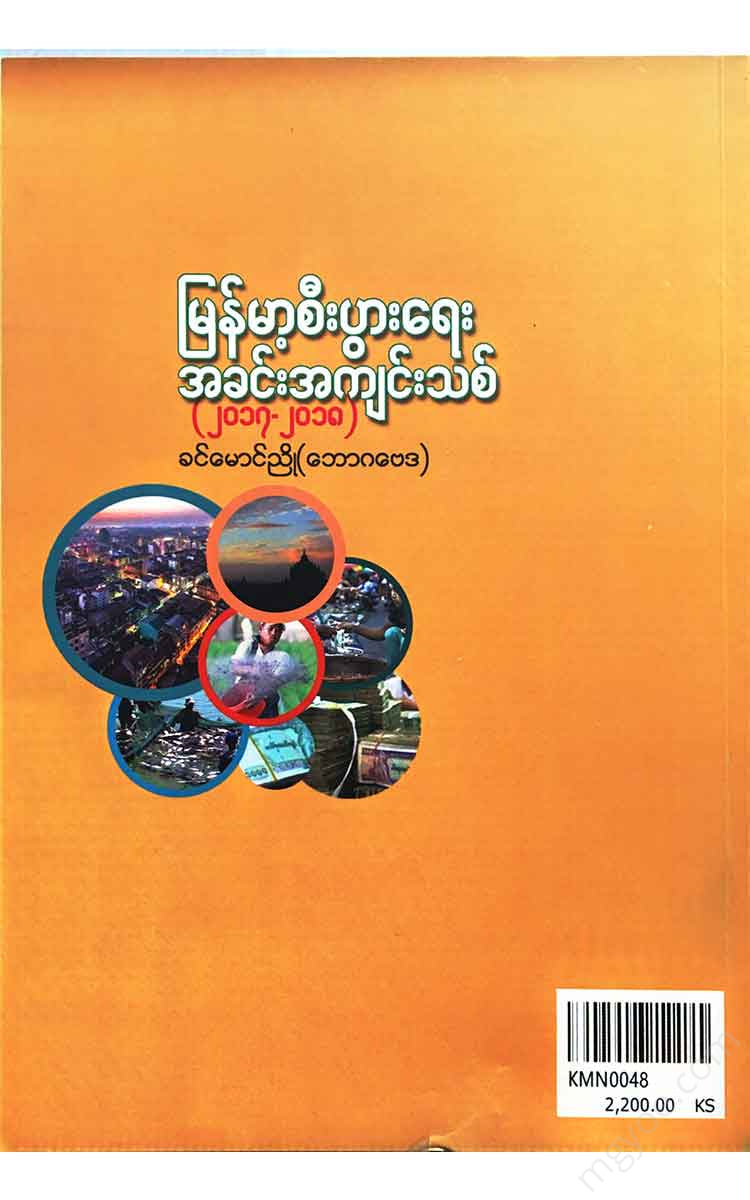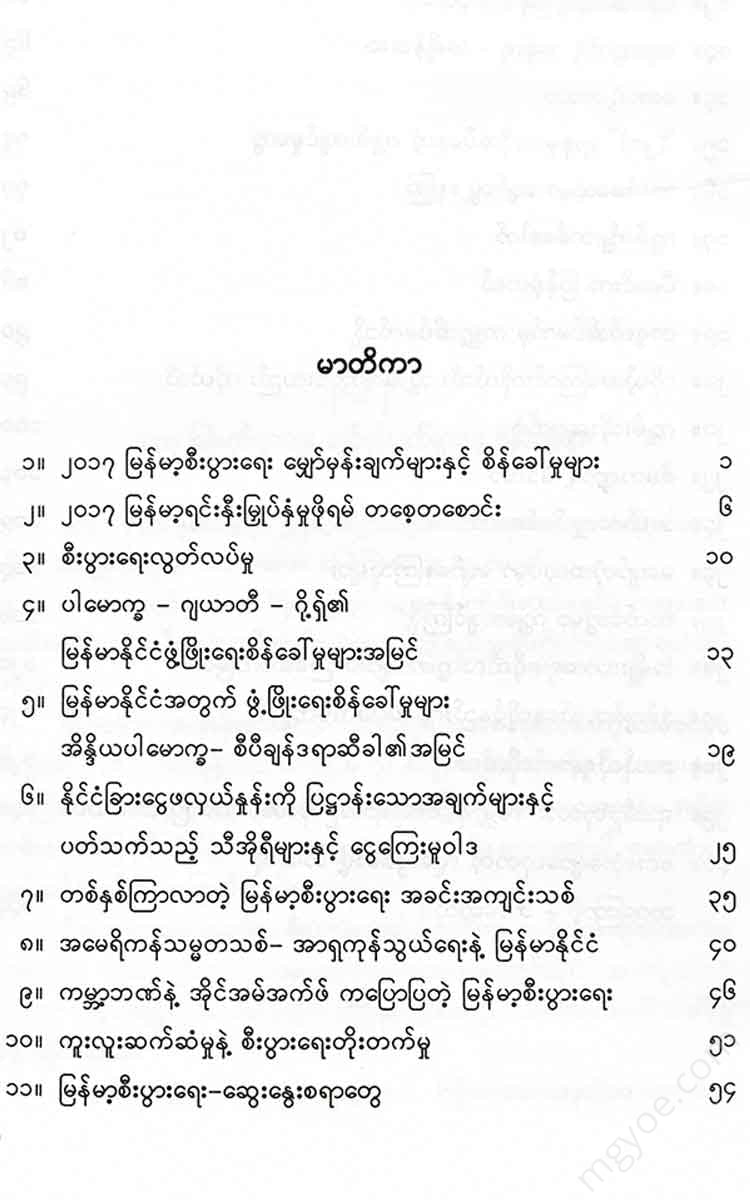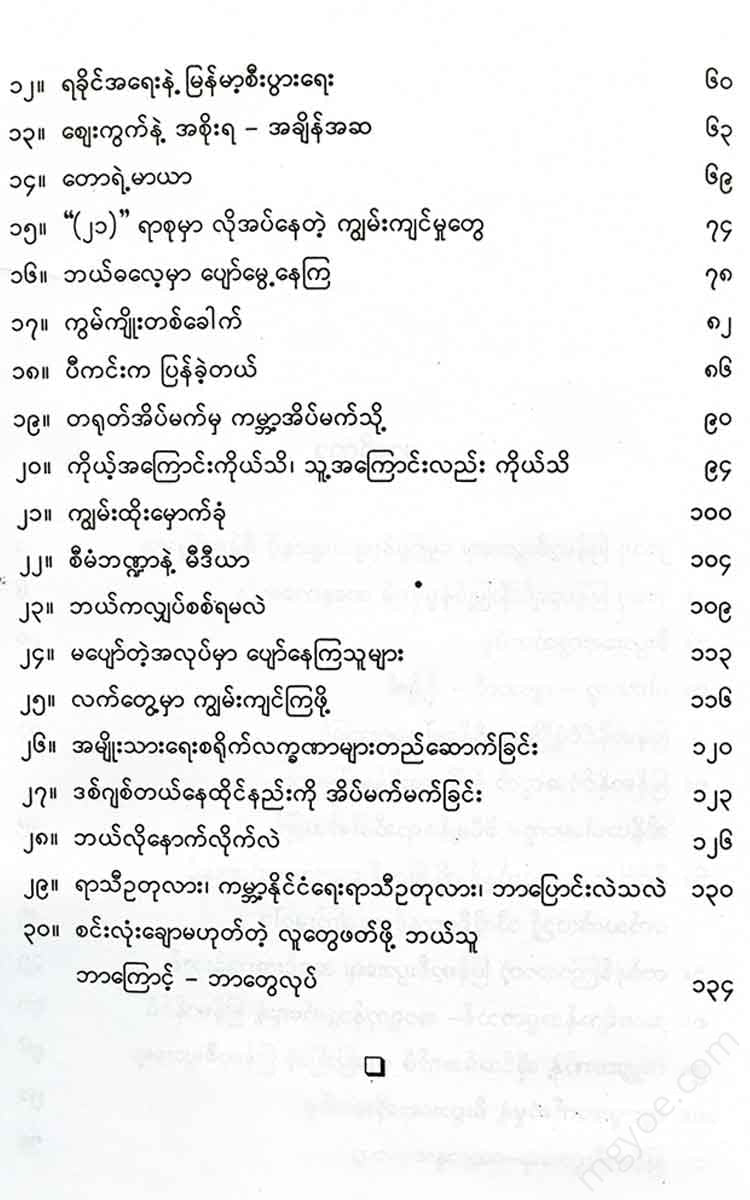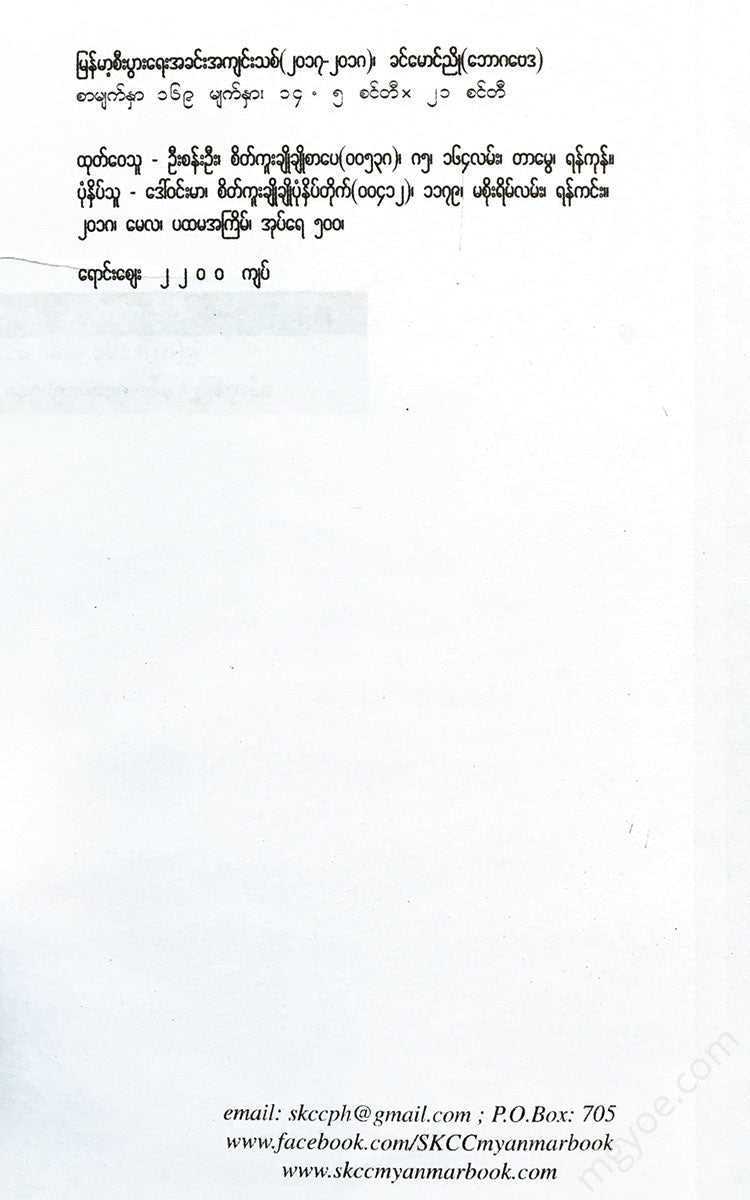စိတ်ကူးချိုချိုစာပေ
Khin Maung Nyo (Economics) - Myanmar's new economic landscape
Khin Maung Nyo (Economics) - Myanmar's new economic landscape
Couldn't load pickup availability
[ 1 ]
Myanmar Economic Outlook and Challenges in 2017
I am currently answering questions about how I see Myanmar's economic prospects in early 2017.
Fortunately, on January 9th, the Planning Commission and Finance Commission held a meeting, so I had something to refer to.
Yes.
Recently, when the new government came to power, new people, new systems, and new people were not yet in place, and officials themselves admitted that economic growth had slowed down. However, since the new government had been able to settle in within the first nine months, everyone was expecting that it would pick up speed in 2017.
It is important to note that the new government's economic policymaking is not solely focused on economic growth, but also includes the goals of inclusiveness, inclusiveness, and long-term development.
Even though efforts to achieve economic growth and development are a laborious task, I am very concerned that if we strive for economic growth that encompasses regions and states, and strive for long-term development, is this too ambitious? I am very concerned that it will harm short-term economic growth.
Looking at the decline in revenue due to the fall in global natural gas prices, the decline in revenue due to reduced timber exports, and the decline in revenue due to the re-examination of mining sector blocks, it shows that there is a moderate short-term impact on long-term development.
On the other hand, electricity production and distribution is not priced to cover costs, but is being produced and distributed at a loss to save the people, and because much infrastructure (physical) needs to be built for the development of the country, there is a need to continue spending.
This year, we enacted a new foreign investment law that does not discriminate between nationalities, so we hope it will be a step forward and a factor in attracting foreign investment.
The Finance Commission's discussion also included the need to continuously pay attention to the existence of the domestic financial market. Recently, during the weekly coordination meetings between the Central Bank, the Ministry of Finance, and the Ministry of Commerce, we noticed that the dollar price in the Myanmar market has also fallen along with the decline in the global market.
Although there are expenses and expenditures, it is known that the government will continue to maintain a sustainable level of spending, with the debt burden increasing, and the budget deficit not exceeding 5 percent of GDP, which is in line with the recommendations of international organizations.
What is unique this year is that 15 percent of the commercial tax revenue collected in kyats, 15 percent of the special goods tax, and 5 percent of the income tax will be distributed from the Union to the regions and states. On the one hand, this distribution for the 2017-18 fiscal year will help the development of these regions, but on the other hand, it will require the necessary capacity to be prepared and used systematically and effectively, so that there will be less waste.
We also saw discussions about the importance of cooperation within the government and between ministries, as well as between the central government and regional and state governments, in implementing projects. In fact, in some departments and organizations, cooperation is often weak even within departments and organizations.
I also noticed that there was a discussion about concerns about international projects, that our development plans should be our own. We should design projects based on the needs of our citizens.
One interesting point is the discussion on how to make projects that benefit the country. Among the projects that have been implemented in the past, they will consider how to reduce, cancel, or collaborate with unproductive projects.
We should continue with the projects we have implemented in the past. We will implement what we can. We will stop what we cannot. We have said at the National Planning Commission meeting (1/2017) that we should try our best to avoid making the same mistakes as before.
As a side note, although the privatization commission has been formed, there is no privatization law yet, and we have not seen any process yet.
As discussed earlier, the 2016-17 fiscal year (2016-17 year-end estimate) is expected to grow by 5.7 percent, and 2017-18 is expected to grow by 7 percent, with the value of aggregate production and services per capita expected to exceed 1.7 million kyats. This suggests that short-term (2016-17) sacrifices are being made for long-term growth. Although international organizations have not yet released year-end estimates of Myanmar’s economic prospects, the Myanmar government’s current estimates are higher than those of international organizations. Based on past experience, the 5.7 percent and 7 percent growth rates mentioned here are not impossible.
The National League for Democracy-led government is also expected to review its performance over the past nine months, identify any shortcomings, and take corrective action. It is possible that the 7 percent growth rate is being targeted to address the challenges of 2016 and accelerate growth in 2017.
I don't think the average person will notice much about economic growth, whether it's high or low. All they will notice is price fluctuations, income opportunities, and job opportunities. It is expected that domestic and foreign investment will drive economic growth, which will in turn lead to increased job opportunities and income opportunities.
One of the most important things is that despite the natural beauty and abundant natural resources, the armed conflicts have not been able to take advantage of the situation, and it is important for peace to be achieved, for the region to be peaceful, and for peace and economic development to coexist.
We must all work together to see the blessed scenes in 2017.
Khin Maung Nyo (Economist)
Freelance Columnist
Senior Adviser, Myanmar-ISIS
Senior RESearch Fellow, CESD
Vice Chairman, Myanmar Economic Association.
Yangon, Myanmar
A Glimpse at the 2017 Myanmar Investment Forum
When I heard about the 2017 Myanmar Investment Forum, I was intrigued. Usually, I don’t get too excited when I hear about other investment forums. The main reason was that I couldn’t afford the cost. This time, I was not sure if I would be able to attend, but my students and friends organized it and I arrived in Nay Pyi Taw, where the forum was being held. The plane from Yangon was full of Chinese businessmen, and most of them didn’t seem to know much about Nay Pyi Taw or Myanmar, judging from the questions asked at the forum. In short, even those who are interested in and constantly study about business structures and businesses really don’t know much and don’t see much. For example, the latest Myanmar investment situation includes a lot of things that I don’t know, and the electricity sector, which is the most interesting sector in Myanmar, has so many figures and information that I can’t even keep up with it.
One thing to note here is that I want the discussions to be concise, with only Burmese and no other language spoken. A mix of Burmese and English is not very convenient. While giving a boatload of statistics may be interesting to some researchers, most people end up not knowing what is going on.
One interesting thing about the Myanmar Investment Forum is that, as I understand it, investment matters are usually handled by the private sector, mainly by the Chamber of Commerce and Industry. Now, the Myanmar Investment Development Association is leading the event, so although I have never heard of it, I am familiar with the individuals and organizations involved. This association aims to connect domestic and foreign investors, and I am happy that it is working, and I wish it success.
Investors from China, Japan, Korea, Singapore, and Brunei who came to the forum were very interested in Myanmar’s trade and investment policies and asked questions. They were very interested in land issues. They wanted to know about clear economic policies and priority programs. I noted at the World Peace Conference that the states and regions were not very aware of the Myanmar government’s economic and investment policies. Now, I also note that the international community, especially Asian countries, are not very aware of them. That is why the Myanmar Investment Commission and its office seem to have changed from a regulatory body to an investment promotion body.
When asked what was different about this forum from the previous ones, he said that there were not many Burmese people attending. He said that there were many Burmese business people attending this forum. It was originally planned for a small number of people, but it gradually increased to almost a thousand. So, the organizers were hesitant, but in the end it worked out. What was interesting about this forum was whether the Myanmar economy would recover in 2017. When an official’s speculation immediately went viral on social media, it became a topic of widespread discussion. Although there were only those who wanted the Myanmar economy to improve, they doubted whether it would actually go ahead and asked what methods were available to make it happen. Since this issue has come to me, if you look at it with a fixed view that nothing will change, you can assume that you will not attend. But you don’t know what tricks are there. And the discussion went back to the fact that things that you don’t think will change today can change overnight, so you can’t completely reject them by saying that you will not attend.
What I often hear at the discussion (especially from foreigners) is that there are many areas to invest in Myanmar, but it is not clear which areas and where to prioritize.
Visitors are also interested in areas such as ports and railways. The problem is that they are not informed about Myanmar's investment environment and developments, and they do not know where to look for information.
They asked about land availability, rent, and rents and prices with great interest, but some of the information they received was incorrect. Even one foreigner who participated in the discussion discussed how the crisis in Myanmar had caused people to lose their deposits and lose confidence in banks. At dinner, he explained that the news was not true and that no people had lost a single penny of their bank deposits. He also admitted that he did not know.
It would be wrong to expect that this forum will immediately increase investment. But it has been able to make people who have never heard of my country think of it as a place to invest in. The forum, which lasted for a day and a half, did not include subjects such as ICT, which some investors are interested in. I understand that it was an effective activity to be able to present the business projects that Myanmar investors are doing.
I prayed for increased domestic and foreign investment and for Myanmar's economy to grow.
(Temporary-Nay Pyi Taw)
